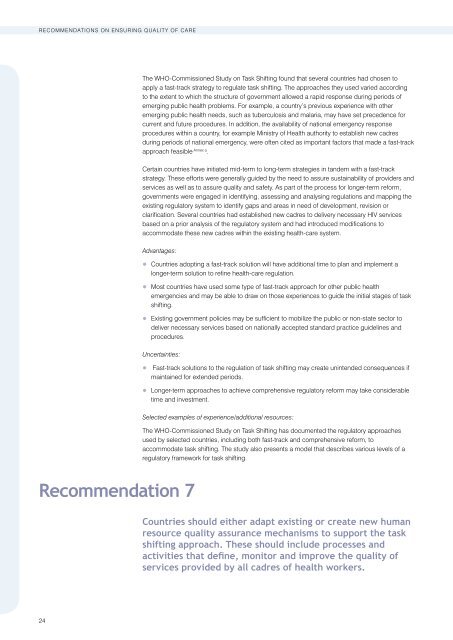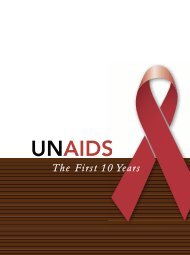Task Shifting - Global Recommendations and Guidelines - unaids
Task Shifting - Global Recommendations and Guidelines - unaids
Task Shifting - Global Recommendations and Guidelines - unaids
You also want an ePaper? Increase the reach of your titles
YUMPU automatically turns print PDFs into web optimized ePapers that Google loves.
<strong>Recommendations</strong> on ensuring quality of care<br />
The WHO-Commissioned Study on <strong>Task</strong> <strong>Shifting</strong> found that several countries had chosen to<br />
apply a fast-track strategy to regulate task shifting. The approaches they used varied according<br />
to the extent to which the structure of government allowed a rapid response during periods of<br />
emerging public health problems. For example, a country’s previous experience with other<br />
emerging public health needs, such as tuberculosis <strong>and</strong> malaria, may have set precedence for<br />
current <strong>and</strong> future procedures. In addition, the availability of national emergency response<br />
procedures within a country, for example Ministry of Health authority to establish new cadres<br />
during periods of national emergency, were often cited as important factors that made a fast-track<br />
approach feasible Annex a .<br />
Certain countries have initiated mid-term to long-term strategies in t<strong>and</strong>em with a fast-track<br />
strategy. These efforts were generally guided by the need to assure sustainability of providers <strong>and</strong><br />
services as well as to assure quality <strong>and</strong> safety. As part of the process for longer-term reform,<br />
governments were engaged in identifying, assessing <strong>and</strong> analysing regulations <strong>and</strong> mapping the<br />
existing regulatory system to identify gaps <strong>and</strong> areas in need of development, revision or<br />
clarification. Several countries had established new cadres to delivery necessary HIV services<br />
based on a prior analysis of the regulatory system <strong>and</strong> had introduced modifications to<br />
accommodate these new cadres within the existing health-care system.<br />
Advantages:<br />
• Countries adopting a fast-track solution will have additional time to plan <strong>and</strong> implement a<br />
longer-term solution to refine health-care regulation.<br />
• Most countries have used some type of fast-track approach for other public health<br />
emergencies <strong>and</strong> may be able to draw on those experiences to guide the initial stages of task<br />
shifting.<br />
• Existing government policies may be sufficient to mobilize the public or non-state sector to<br />
deliver necessary services based on nationally accepted st<strong>and</strong>ard practice guidelines <strong>and</strong><br />
procedures.<br />
Uncertainties:<br />
• Fast-track solutions to the regulation of task shifting may create unintended consequences if<br />
maintained for extended periods.<br />
• Longer-term approaches to achieve comprehensive regulatory reform may take considerable<br />
time <strong>and</strong> investment.<br />
Selected examples of experience/additional resources:<br />
The WHO-Commissioned Study on <strong>Task</strong> <strong>Shifting</strong> has documented the regulatory approaches<br />
used by selected countries, including both fast-track <strong>and</strong> comprehensive reform, to<br />
accommodate task shifting. The study also presents a model that describes various levels of a<br />
regulatory framework for task shifting.<br />
Recommendation 7<br />
Countries should either adapt existing or create new human<br />
resource quality assurance mechanisms to support the task<br />
shifting approach. These should include processes <strong>and</strong><br />
activities that define, monitor <strong>and</strong> improve the quality of<br />
services provided by all cadres of health workers.<br />
24

















